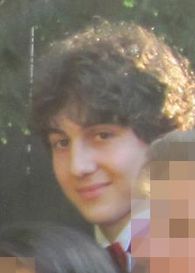(Updates below)
Aside from the names themselves, Tamerlan Tsarnaev, aged 26 and now dead, and Dzhokhar Tsarnaev, aged 19 and at this time on the run, the other detail about the brothers linked to the bombings that will receive greatest attention in the media today is their connection to Chechnya. USA Today already has a headline: “Russia’s Chechnya, Caucasus: A breeding ground for terror“.

Dzokhar Tsarnaev at prom party.
More significantly perhaps than their Chechen origin could be that these are two young men whose identities will inevitably have been shaped by the post-9/11 zeitgeist and the gulf this has created between Americanness and foreignness.
Alienation is no excuse for terrorism, but every American should pause to consider what it means for those who grow up in this country yet in multiple ways receive the message that they don’t belong here.
As has been the case throughout the last decade, the greatest threat to America is not terrorism; it is xenophobia. This is the virus of suspicion that makes a foreign name and a slightly darker complexion, reason to trust someone less and for no other reason than that they are not white.
Update 1: J.M. Berger, a regular contributor to Foreign Policy and someone widely viewed as a level-headed “terrorism expert”, tweets:
So all I, and it seems anyone else, knows for sure right now is that these guys are Chechens.
— J.M. Berger (@intelwire) April 19, 2013
Chechen identity must be baked in at birth. The first nine years of Dzhokhar Tsarnaev’s life in Russia must have influenced him much more deeply than the following ten in the United States. Likewise, his older brother’s apparent interest in jihadist teachings again speaks most loudly of his Chechen roots. Or perhaps not.
The search for identity and the need for roots often becomes most intense among those who feel rootless. It seems less likely that as children the Tsarnaev brothers brought their extremism from Chechnya than that their experience of living in America led them in search of something they either couldn’t find here or felt excluded from here.
Update 2: From this report, it sounds like if alienation figures in this story, it may apply much more to the older than the younger brother. Dzhokhar’s involvement might hinge on nothing more than sibling dynamics in which the older brother cultivates the admiration and loyalty of his younger brother and the younger tries to impress the older by his willingness to take risks.
Update 3: On a day when so-called experts will be circulating round news shows describing Chechnya as a hotbed of Islamic extremism, I’m sure this will be making Vladamir Putin happy. Easily forgotten is that before 9/11 Chechnya was synonymous with Russian brutality.
In 2000, U.S. Secretary of State Madeleine Albright at the UN said:
We cannot ignore the fact that thousands of Chechen civilians have died and more than 200,000 have been driven from their homes. Together with other delegations, we have expressed our alarm at the persistent, credible reports of human rights violations by Russian forces in Chechnya, including extrajudicial killings.
That was before the U.S. government itself adopted the practice of extrajudicial killing through drone warfare.


Well, the younger one had received scholarships at more or less the best schools in Boston–a peculiar way of telling him he doesn’t belong here.
They may have felt a kind of psychic homelessness– common to millions of immigrants through the ages. But it takes the internet and jihadism to translate that into terrorism.
from what I read, the brothers have been received warmly and were accepted into the system. They both went to American schools, received grants. Had the same opportunity as anyone else or maybe even more so for being a “minority” how does that have to do with Alienation???? and evil acts?
Understanding the brothers’ motives probably depends at this point on the slim possibility that Dzokhar is arrested rather than killed. Accounts by those who know him that he has a “heart of gold” and other similar expressions of affection do not paint a picture of an alienated young man. His older brother on the other hand said “I don’t have a single American friend. I don’t understand them.” That sounds like deep alienation. But to say he was alienated is not to imply that this resulted from an unwelcoming response from the Americans he encountered. Sixteen years old is a very difficult age to make the transition to a radically different culture.
Having said that, to the extent that Tamerlan found his identity in being Chechen and Muslim and found something appealing in jihadist doctrine, it’s not hard to see how that could have led to animosity towards the United States. Since 3,000 Americans died on 9/11, hundreds of thousands of Muslims have died in American wars in Muslim countries. The perception that the U.S. launched a war on Islam is not without foundation.
The greatest failure in America’s approach to counter-terrorism has been lack of attention to understanding what motivates individuals. The very idea that the U.S. faces a terrorist threat creates false assumptions about the nature of terrorism. In the case of the Tsarnaev brothers, I can’t help but wonder whether Hollywood might have had as big an influence on their conceptions as might any kind of radical agenda.
You make a very good point here Paul. The war on Muslims alone is enough to cause alienation, especially in young people. Consider also, as you pointed out, Hollywood, as well as the video game industry, has had their more than fair share in shaping hatred too, along with the U.S. Government leaders and think tanks. After all, no one can deny that this country has been & continues to be brainwashed by out handlers.